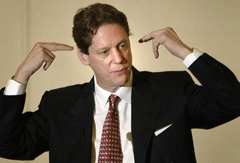
It was still dark on the morning of Nov. 6, 2005, when the snaking convoy of trucks departed the Burmese coastal city of Rangoon for the jungle. The ruling military junta had just ordered all 32 government ministries to move 320 kilometres north to a new capitol (named Nay Pyi Daw -- "resting place of the king") with little more than a day's notice. The move was apparently motivated by fears of U.S. invasion, after Condoleezza Rice renounced the country earlier that year as an "outpost of tyranny" for its human rights record and complicity in drug production and trafficking.
In a scene reminiscent of Apocalypse Now, State Peace and Development Council (SPDC) General Than Shwe secured his seat of power in the midst of a vast fortified compound surrounded by mountains and dense tropical jungle.
It is in this environment of paranoia and bureaucratic instability that legendary Vancouver mining financier and Ivanhoe Mining Ltd. executive director Robert Friedland has thrived and prospered in Burma since the early 1990s. Friedland's Ivanhoe umbrella of companies is credited with bringing to production the US $90 million Monywa copper mine in 1999, by far the largest mining investment by a foreign company in Burmese history -- and a cash cow for the government which retains a 50 per cent interest in the joint venture.
Today Ivanhoe Minerals Ltd. is one of a dwindling group of B.C.-based resource companies connected to the Burmese military government. But in the wake of the recent violent repression of protests in the country, Friedland surprised many last week by not only denying his Ivanhoe Mining Ltd. was still connected to Burma, but by denouncing his former military business partners.
"We share the revulsion of right-thinking people everywhere against unwarranted assaults on Buddhist monks and civilians," read a statement from Ivanhoe directors released Oct. 3, adding that the company "deplore[ed] the fact that so many years of discussions within Myanmar about constitutional change now appear to be jeopardized by the reactions of the state."
The day before that statement, Vancouver-based junior miner Jet Gold Corp. announced it too was leaving Burma -- and abandoning its Set Ga Done gold concession in Shan province, which it had planned to explore with Calgary's Leeward Capital Corp. in a three-way partnership with the an arm of the military junta.
The timing of both departures had more to do with business than ethics, despite the influence of ongoing US/EU sanctions, shareholder activism and kindled Western public sentiment toward the plight of Burmese monks. As the 2005 relocation of the capitol demonstrates, doing business in modern Burma has in many ways become untenable.
"There are pros and cons of doing business in a place like Burma," says Catherine Coumans, Research Coordinator for Mining Watch Canada. "Because the government gets a percentage of all mining projects, it's in their interests to ensure a project has smooth sailing ... there won't be problems over environmental impacts, labour impacts, community impacts, and that makes for easy mining. But the downside is that military dictatorships are often unstable internally, doing things like moving its capitol into the jungle."
Ivanhoe's troubles in Burma
Ivanhoe's past success in Burma hinged on the closeness of personal connections to the dictatorship. In the early 1990s, Vancouver businessman and Burmese national Reggie Tun Maung was hired as senior vice president of Ivanhoe Myanmar Holdings. (Tun Maung's son is married to the daughter of SPDC Deputy Prime Minister Vice-Admiral Maung Maung Khin.) It was this company that sealed a compact with the Burmese regime in 1994 to exploit the Monywa copper deposit.
Reliant on good relations with his military joint venture partners, billionaire Friedland has been a defender of the regime, preaching a philosophy of engagement with the military as an agent of political reform.
"I am firmly convinced that Canadian companies going to a country like Myanmar to engage in business will help the average person there," he told the Globe and Mail in 1997. "I will tell you there is no country in Asia that is a perfect democracy."
Despite enjoying a privileged status with the regime, Friedland was looking to sell his stake in the Monywa Copper project as far back as March 2004, when he hired investment bankers to review "strategic alternatives."
Friedland's frustration with the military bureaucracy was growing. Plans to expand the mine in early 2005 -- which were deemed necessary for the "continued economic development" of the sites -- were stymied by the Burmese government. The mine was unable to obtain the required import permits for its mining equipment needed for expansion. Also in 2005, the regime suddenly placed an 8 per cent commercial tax on the mine's commercial copper exports, despite a previous agreement stating exports would be exempt from all tax.
Economic sanctions imposed against Myanmar by the United States had also started to "seriously impact the mine's ability to function in a normal way," according to regulatory documents filed in March 2006. In the fourth quarter of 2005, both the mine's insurance broker and the off-shore banking institution terminated their relationship with the mine on account of the sanctions. This caused the mine to temporarily shut down in spring of 2006.
'Divested' from Burma, but still profiting
Added external pressure was coming from high-profile partners concerned about the optics of Ivanhoe's Burma activities. In October of 2006, Rio Tinto of Britain agreed to partner with Ivanhoe on the Oyu Tolgoi project in Mongolia (among the world's largest undeveloped copper deposits) on the condition that it divest itself from Burma.
"Clearly, Myanmar was not a country that we as a company wanted to have an involvement with, so we did make it a condition that as part of the agreement with Ivanhoe that they would dispose of it," a Rio Tinto spokesman told the Globe and Mail on October 3.
Friedland complied. In February of 2007, Ivanhoe Mines Ltd. transferred its 50 per cent stake in Monywa to an unnamed third party trust, which took control of the assets with the intention of selling them off. This move has satisfied Rio Tinto, but since July, the company has received dividend payments from the joint venture with the Burmese dictatorship, including a payment of US $6.6 million.
Ivanhoe therefore is still indirectly profiting from its Burmese assets, despite Friedland's October denunciation of the ruling Burmese junta. (Officials at Ivanhoe Mining Ltd. in Vancouver did not return calls to The Tyee, in order to clarify).
Leeward Capital Corp and Jet Gold Corp.
In the case of Vancouver's Jet Gold Corp. and partner Leeward Capital Corp, the Oct. 2 decision to abandon its Set Ga Done gold concession -- encompassing 70,000 square hectares of land bordering China's Yunnan province -- was motivated by funding problems of a partner and what Leeward management called "recent political instability."
"...in the last several years, it has become increasingly difficult to operate under inflexible bureaucratic rules imposed on our operations," read a statement from Leeward president James W. Davis. What rules are referred to are uncertain, as both companies involved did not respond to calls from the Tyee before deadline.
Leeward Capital Corp, and in particular, mining geologist James W. Davis who leads the corporation, is an example of an ambitious Canadian miner who has repeatedly suspended Burmese operations but never actually left. Davis's presence in the region pre-dates the Bre-X mining scandal of the mid-'90s, which saw most financing for mining exploration completely dry up. Leeward Capital survived in Burma during this time by developing a side-business buying Burmese amber called Burmite from local miners in Kachin state and reselling 100-million-year-old amber-embedded insects and botanicals to such customers as the American Museum of Natural history.
In the late 1990s Davis set up a local company with a partner in Kachin state, and established relationships with both local miners and the northern military commander of the region. In an interview with Business Edge magazine in 2001, Davis said the partnership would mine 500 kilograms of burmite that year.
Questioned about the ethics of operating and partnering with the dictatorship on the amber project in 2001, Davis echoed Friedland. "There's only two ways that a country like Myanmar [Burma] can advance democratically, which is by revolution or by evolution. I prefer evolution because a lot less people get hurt that way."
Like Ivanhoe Mining Ltd., Davis's company has paid a price for operating in Burma. Leeward Capital's amber business was listed on the 2007 "Dirty List" by the London, England's The Burma Campaign, which publicizes companies operating and cooperating with the dictatorship.
Included on the list was another Davis vehicle -- Taiga Consulting Inc. of Calgary -- which the Burma Campaign describes as a Canadian geological consulting firm with offices in Burma, which "works closely with the regime exploring for base and precious metals."
Greener pastures in Mongolia, Kazakhstan and... Terrace
Canadian resource companies leaving Burma -- whether for ethical reasons, or due to the challenges of dealing with a military dictatorship -- are hardly without hospitable places in the developing world to explore.
Mongolia is in Friedland's sights as the company moves forward with the development of the world's largest copper-gold porphyry project (mentioned above). This is in addition to Ivanhoe's exploration rights through central and southern Mongolia, where copper, gold and coal discoveries have reportedly been made. An Ivanhoe subsidiary also holds a 70 per cent interest in the Bakyrchik gold project in north-eastern Kazakhstan.
Jet Gold Corp.'s CEO Robert Card's mind is also far from Burma -- his company is involved with oil and gas exploration in Texas and North Dakota, coal exploration near Terrace, B.C., and earlier this year, it abandoned a gold exploration program near Atlin, B.C.
Leeward Capital Corp is busy exploring the comparatively low-risk Northwest Territories for diamonds and northern B.C. for molybdenum. Yet for geologist-executive Jim Davis, breaking ties with Burma has been hard to do -- despite receiving world-wide attention for his presence in Burma, regulatory documents show that Davis's "amber project" recently spent over $200,000 on mineral property exploration in 2007.
Related Tyee stories:
- Inside BC's Mining Boom
Why billions are pouring in for copper, coal, uranium. - Turning Down a Gold Mine
In Guatemala, angry locals vote no, but BC firm presses on. - Are You a 'Global Citizen'?
In places like Burma, Canadians might be accused of complicity with repressive regimes.















Tyee Commenting Guidelines
Comments that violate guidelines risk being deleted, and violations may result in a temporary or permanent user ban. Maintain the spirit of good conversation to stay in the discussion.
*Please note The Tyee is not a forum for spreading misinformation about COVID-19, denying its existence or minimizing its risk to public health.
Do:
Do not: